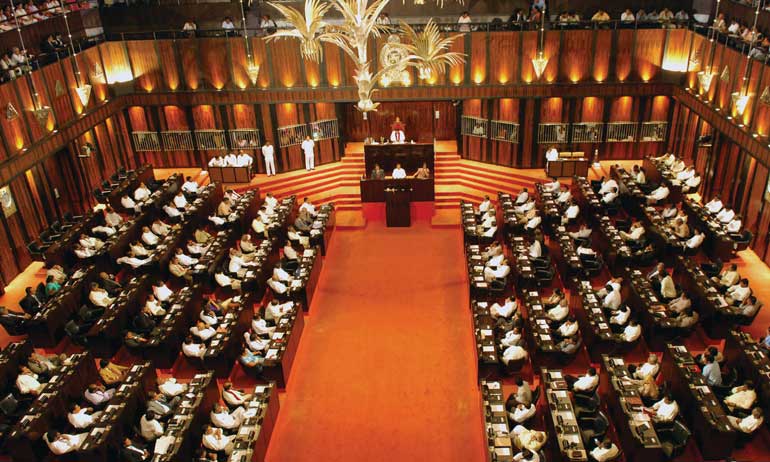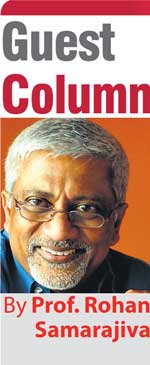Tuesday Feb 17, 2026
Tuesday Feb 17, 2026
Wednesday, 16 October 2024 00:20 - - {{hitsCtrl.values.hits}}

What many who run for office forget is that they are seeking to become members of a legislature
|
 Several years ago, I was at what was perhaps the inaugural meeting that launched the rankings of MPs by Manthri.lk. I recall a panel comprising the parliamentarians who had the highest rankings. A leading question from the moderator about research support confused a young MP on the panel. He had achieved his high rank by asking lots of parliamentary questions about the various problems faced by his constituents. He could not understand what research support had to do with constituency service which was his understanding of the job.
Several years ago, I was at what was perhaps the inaugural meeting that launched the rankings of MPs by Manthri.lk. I recall a panel comprising the parliamentarians who had the highest rankings. A leading question from the moderator about research support confused a young MP on the panel. He had achieved his high rank by asking lots of parliamentary questions about the various problems faced by his constituents. He could not understand what research support had to do with constituency service which was his understanding of the job.
I was reminded of this incident when a young man who had just been nominated as a candidate for the Colombo District called me. This was his first run for office. Induction programs are conducted for novice MPs by Parliament but they do not seem to be very effective. Perhaps the better approach is to educate them before they get elected; and, as voters, to assess the candidates on all dimensions of performance required of MPs, not just the over-emphasised constituency service function.
Legislation and oversight
What many who run for office forget is that they are seeking to become members of a legislature (and maybe the Cabinet later). The primary purpose of a legislature is to make laws. Increasingly, the bills that come up for approval are quite complex. They have been worked up by technical committees, influenced by the Minister and Cabinet, written and shaped by the Legal Draftsman’s Department and the Attorney General’s Department, and ruled upon by the Supreme Court by the time they come to Parliament. It requires commitment, skill, and the assistance of advisors to properly perform the legislative function these days.
The pre-screening of bills by sectoral oversight committees that was reintroduced in 2022 allows even novice MPs like my young friend, if he were to be elected, to make substantive contributions to the legislative process. The deliberative process in these committees is inclusive and differs significantly from the party-line posturing that characterises the debates in the chamber.
The procedure by which laws are made are heavily weighted in favour of the executive, with almost all laws originating inside the executive and being drafted under the direction of Cabinet. The legislators are assigned a reactive role. This is quite different from the law-making procedure in the United States for example, where any legislator can proactively draft and submit bills. This is not impossible, but is quite rare, in Sri Lanka.
|
Private member’s motions are how individual legislators can escape the reactive role assigned to them. They may not become law immediately, but they can prepare the ground. This was the case with the private member’s motion on the right to information moved in 2010 by then opposition MP Karu Jayasuriya. It was not allowed to progress in that Parliament, but served as an important step in Sri Lanka’s journey to establishing a constitutionally guaranteed right to information in five years later.
A recent success story is the private member’s motion moved by Premnath Dolawaththa (who is being nominated in Colombo District for a second term in the forthcoming election) to restore the reservation for youth in nominations for local government elections. This bill was enacted in the 9th Parliament itself, in which Dolawaththa served as a first-time MP. Other motions that he moved sought to amend some archaic provisions in the Penal Code and to break the deadlock on amendments to the Muslim Marriage and Divorce Act. The former was gazetted and cleared by the Supreme Court but was not allowed to advance. But it is hoped that these bills too will make it into the law books like Karu Jayasuriya’s private member’s motion in 2010.
|
Dolawaththa who was ranked sixth among 225 MPs in the 9th Parliament by Manthri.lk is a good example for my young friend, Keshal Jayasinghe, on what a backbencher can achieve in his first term. Being on the same slate, though from different factions, perhaps they can even work together.
Article 148 of the Constitution assigns full control over public finance to the legislature. Other than party-line votes to pass the budget at the behest of Cabinet, this function was performed desultorily by past Parliaments. However, the activation of new committees such as the Ways and Means Committee and the increased responsibilities taken on by the Committee on Public Finance have created new opportunities for MPs to discharge their duties under Article 148.
The Parliamentary Budget Office Act, No. 6 of 2023, has the potential to be a game changer. It would therefore be wise to assess candidates in terms of their capacity to understand and act on complex financial matters in collaboration with the Budget Office, once it is operational.
|
Constituency service
When citizens face insurmountable problems with the State, they need a remedy. In some cases, the solution is a change in the procedure, which requires a change in law or policy and affects more than the complainant. In others, it simply requires the MP to assess the issue affecting the individual and write to the relevant official asking for reconsideration. Some MPs use the mechanism provided by the Parliament’s public petitions committee. Others present individual complaints as parliamentary questions.
In Sri Lanka, the meaning of constituency service has been distorted over time to include matters such as springing people from remand and providing assistance in cash or kind for various ceremonies and events organised by constituents. The former should be illegal. The latter makes heavy demands on the finances of the MP and may be a causal factor fostering corruption in various forms. There will be no system change until voters cease to select their representative on how they helped get individuals out of remand or on the quality of the bus that was provided for a pilgrimage.
I have no idea how Dolawaththa will fare if judged on such criteria, as he will be by some voters. For the benefit of the more enlightened Colombo voters, I have highlighted his performance on the core functions of an MP. More details are available at Manthri.lk where activity can be retrieved by name search. My young friend, Keshal Jayasinghe who is contesting under the Cylinder symbol, has no track record as an MP. Here, the voter who wants to infuse fresh thinking into the political process will have to read up on his tutelage under the late Mangala Samaraweera.
|